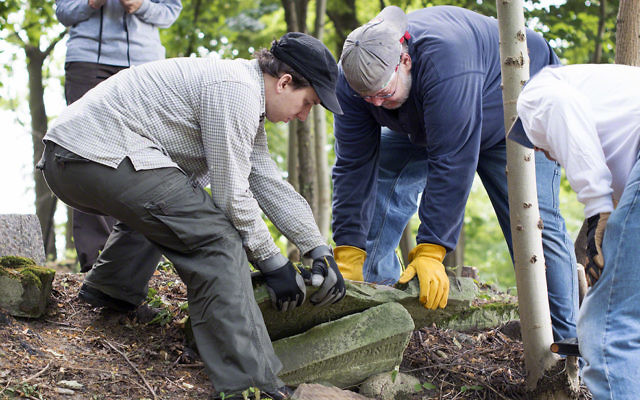Minister Builds Bridges One Grave at a Time
By Jan Jaben-Eilon
An increasing number of Atlanta congregations are organizing trips for their members, but instead of going to Israel, they are traveling to the ancestral home of approximately 80 percent of American Jews: Poland.
Both The Temple and Congregation Etz Chaim have taken trips to Poland in recent years, and Temple Sinai plans a Poland visit for the summer of 2017.
One Atlantan annually spends weeks in Poland to restore Jewish cemeteries, but most Atlanta Jews have never heard of him.
That may be because Steven Reece is a Southern Baptist minister.
In 2010 he launched the Matzevah Foundation, named for the Hebrew word for a gravestone, which organizes Jewish cemetery restoration projects in Poland that include Christians, Jews and local Poles. Although a connection to Jewish cemeteries in Poland might seem a stretch for a Southern Baptist minister, Reece’s passion developed organically.
A professional photojournalist, Reece was drawn to Poland in 1988 after seeing photographs of Christians living in Communist Poland. After studying at a U.S. seminary, he returned to Poland in March 1997, which is when he began to understand the complex relationship between Poles and Jews. An offhand comment by a waitress in Otwock, outside Warsaw, led him to the local Jewish cemetery.
“I began to research why cemeteries were important to Jews. I saw a website about a Polish Jewish cemetery restoration association, and I was hooked,” he said. “I feel I owe a debt to Jews for being a vessel of G-d. On a practical level, for me, the outcome isn’t the restoration of a cemetery, but the restoration of a relationship which was endearing. Jews gave birth to Christianity. And a great evil was perpetrated,” a reference to the Holocaust.
“It should be Christians who take the first step because the Shoah happened during the Christian reign in a Christian country,” Reece said. “Ninety percent of the people were Christian. The theological aftermath of the Shoah was very difficult. We were viewed as perpetrators or people who just stood idly by. Christians must understand the Jewish perspective of the Shoah. Our response should be one of justice.
“The essence of this is mercy and lovingkindness, which is the highest expression for Jews. I felt we, as Christians, could go into this no man’s land between Christians and Jews.”
Although the members of the board of the Matzevah Foundation are Christian and its work in Jewish cemeteries in Poland has been accomplished by Baptists and Catholics, Reece’s goal has always been to include Jews in his restoration projects. He noted that it’s considered a mitzvah for Jews to take care of their cemeteries.
But he has not found much interest among American Jews. “This surprised and saddened me,” he said. “The primary Jewish response in North America has been, ‘Why should we go back? It’s a graveyard.’ The second response has been ambivalence.”
Reece said that restoring graveyards isn’t about death, but about the lives of Jews who thrived in Poland for centuries. “These people had lives and died and were put in graveyards, which families cared for. … Why should we just walk away because of seven years of death? Should those seven years represent all of Polish Jewish life?”
Reece, who lived in Poland for years and speaks fluent Polish, thinks American Jews have allowed a piece of themselves to be cut off from their history because of the Holocaust.
Two years after he created the Matzevah Foundation and now living in Atlanta, he sought contacts in the local Jewish community. He sent a letter introducing his project to the Atlanta Rabbinical Association and letters “to every rabbi of every congregation. I didn’t distinguish between Reform, Conservative or Orthodox.”
He said he received only one response, from Rabbi Peter Berg of The Temple, and they have continued a dialogue.
“I met with Steven because he asked,” Rabbi Berg said. “The first time, I did not know him or what he did; I just responded to his meeting request. But I have come to admire him and the mission of Matzevah, especially since returning from Poland and seeing the cemeteries firsthand. He is doing good work, and it comes from a genuine place.”
In Poland, Reece works with a representative of Poland’s chief rabbi and with the Foundation for the Preservation of Jewish Heritage (FODZ) in Poland. When they asked him why he was interested in restoring Jewish cemeteries in the country, he had one word: “Reconciliation.”
This summer Matzevah will work on five cemeteries, including one in Oswiecim, near Auschwitz. For the first time he will work with two American Jewish groups on restorations. In one case, eight family members and descendants from Markuszow will work on that community’s cemetery.
Reece said FODZ wants descendant groups to champion these cemeteries. “I am developing a collaboration model for how descendants in North America can partner with local Poles to care for the cemeteries. My role is only consultative.”
Living in the United States after Poland hasn’t been easy for Reece. “When I came back from Poland, I couldn’t re-enter the Baptist world. What I do doesn’t resonate with the Baptist community,” but he’s also out of step with the Jewish community.
“I stand as a hybrid between Jews and Christians, but I’m neither one,” he said. “I’ve become a third culture. For the person in the middle, I have to show grace to both sides. But that’s what bridge builders do.”






comments